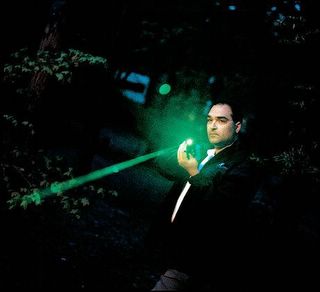Dear Postindustrial Capitalism
from In These Times Magazine -- March 24, 2006
By Jessica Clark
Can I resign as the CEO of Brand Me, Inc? While profits and productivity are up, and product recognition is on the rise, the worker is complaining of long hours, tension headaches and job insecurity. Please advise.
Since early January, to the horror of my inner artist, slacker and cynic, my “inner executive” has been consulting a personal productivity advisor. David Allen, the mastermind behind Getting Things Done: The Art of Stress-Free Productivity, which recently hit No. 1 on the Business Week paperback bestseller list. Allen sports a tie and wire-rimmed glasses, and spouts a brand of management-speak that would set most lefties’ teeth on edge. Yet, his hippie past peeks through—Allen defines the goal of implementing his persnickety efficiency tactics as achieving a “mind like water.”
To help you reach that crystalline consciousness, GTD (as the book is known to acolytes) employs a bottom-up approach to dealing with all the junk that’s bugging you now—the crap on your desk, the nagging voices in your head, your closet clutter and your unrealized ambitions. Each of these unprocessed items, says Allen, represents an “open loop,” a commitment that your unconscious will hound you about until you record or reckon with it.
Once collected, this crud must be molded and sorted into categories: “trash” (the most satisfying), “reference” (sort of soothing) and “projects” broken down into “actionable items” sorted by “contexts” like home, office or phone. Allen then prompts devotees to review this project list—the backbone of the system—each week. Performed religiously, this routine transforms an adrenaline-fueled daily grind into a game of strategy that reformats dead time into do-time. By emptying your “psychic RAM” into this system, Allen argues, you free your mind for creative thought and arm yourself for rapid response to the changing exigencies of life.
With clients ranging from the U.S. Air Force to Lockheed Martin to the American Red Cross, Allen has hit it big in the business-consulting world. He’s also attracted a slew of less-conventional followers. The self-proclaimed “geek” world is enraptured by GTD; cult metaphors abound in the dozens of blogs, Wikis and software projects devoted to dissecting each phase of his method (check out http://del.icio.us/tag/gtd for a sampling). Wired writer Robert Andrews calls Getting Things Done, first published in 2001, a “holy book for the information age,” while blogger Anil Dash praises Allen for delivering an “aspirational digital lifestyle.” The GTD-infused word “lifehack” has become so popular that the editors of the New Oxford American Dictionary selected it as a runner-up for the 2005 Word of the Year.
Why has GTD generated such adulation? Merlin Mann, whose blog “43 Folders” has become a hub for the GTD community, provides some insight.
“Geeks are often disorganized or have a twisted skein of attention deficit disorders,” he writes. They also “crave actionable items and roll their eyes at ‘mission statements’ and lofty management patois,” and “have too many projects and lots and lots of stuff.” Sound familiar?
It should. In many ways, “geeks” are the canaries in the New Economy’s coalmine. Programmers and knowledge workers often operate as free agents in the digital economy—self-employed or contract workers with little job security and a constant need to reinvent themselves for new employers. Working at home or remotely, they are overwhelmed by a barrage of e-mails and media inputs, lack the structure and community provided by conventional offices, and must erect or erase hard boundaries between their personal and professional lives. Such a vacuum of external supports and structures means that such workers must find new systems for setting goals, defining next steps, and managing the “project” of life.
In 1950, sociologist David Reisman noted a major cultural shift in his influential book, The Lonely Crowd. He argues that over the years, Westerners’ social character has gone through three stages: the tradition-driven mode of the pre-modern era, the “inner-directed” style associated with industrialists and pioneers, and the mass-society “other-directedness” of the peer-driven consumer and office worker. GTD is a system that supports the emergence of yet a new character—what one might term the “self-directed” global creative.
Increasingly missed by social safety nets, unbound from traditional familial and cultural ties, atomized by free-market philosophies and awash in a sea of niche-defined consumer and lifestyle choices, the “self-directed” are wracked with anxiety. GTD supplants what Reisman described as the “gyroscope” of the inner-directed—an internalized set of values inculcated by society—with an inner index of individualized choices, projects and goals. This portfolio can then travel with you across jobs, cities, families, subcultures and life stages, absorbing anxiety along the way.
As Allen puts it, GTD trains your “inner committee”—providing “organization development from the inside out.”
Now, usually, at this point in a progressive critique of a business book, my inner satirist would be mocking Allen and his readers as bourgeois, work-obsessed drones lacking the requisite class consciousness to understand their plight. But such a critique is both facile and unimaginative.
The personal empowerment genre does present real dangers, as NYU sociologist Micki McGee points out in her recent book, Self-Help, Inc. “The capitalist demand is that one ‘be all one can be’: human capital, as with any other natural resource, is to be developed and exploited,” she writes. Yet, at the same time she continues, “The democratic demand—and promise—is that one will get to ‘be all one can be’: a human being reaching his or her greatest potential in association with others.” She goes on to note:
If one imagines self-help culture not only as a means of social control but also as a symptom of social unrest that has not found a political context, then, given the exponential growth of self-help reading, there is no shortage of unrest or dissatisfaction. Understood in these terms, self-help culture could potentially offer an enormous opportunity for cultivating social change.
It is this promise that attracts me to GTD, and to helpful and optimistic lifehackers like Mann and Ethan J. A. Schoonover, a freelance photographer and global gadabout who has come up with his own GTD twist at kinkless.com. While Allen’s system might read like a hybrid of soulless corporate disciplines like Total Quality Management and the deracinated Zen of stress-management retreats, it is surprisingly effective, and often fun. As a recent article in the Guardian notes, the initial “mind sweep” of projects “can be both traumatic and oddly liberating.”
These are tools not just for creating new ways to work, but for carving out time for leisure, action and reflection. As a self-proclaimed geek who straddles two increasingly volatile and insecure vocations—journalism and progressive politics—how can I resist? And then, there’s the lure: “mind like water.”
“Before GTD I used to have a really hard time getting to sleep,” says Schoonover. “My head would hit the pillow and my brain would start cycling through all these ideas. With GTD I do a much better job of capturing ideas as they come to me throughout the day. The improvement in sleep alone is worth the price of admission.”
Jessica Clark is the executive editor at In These Times.


















